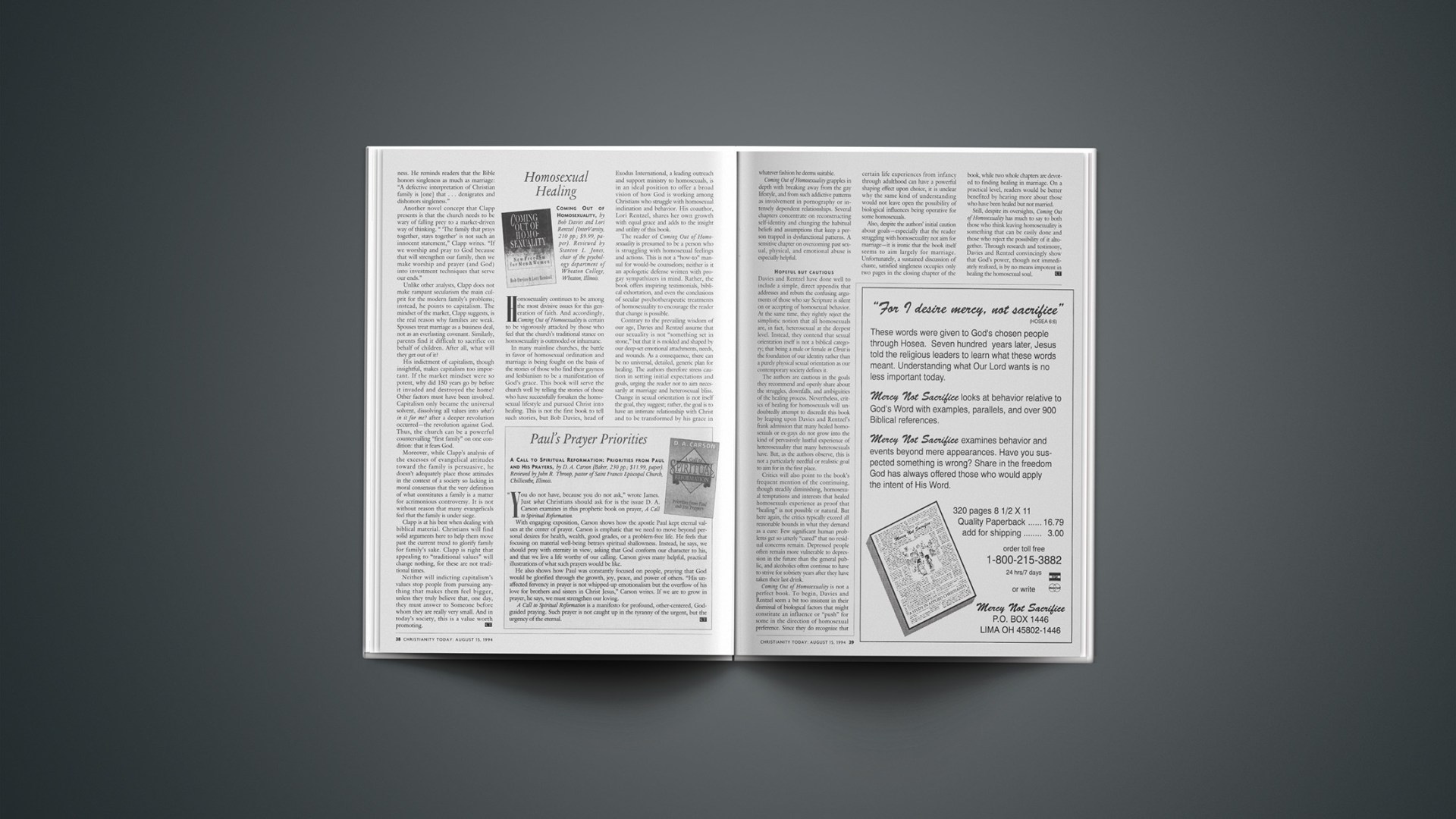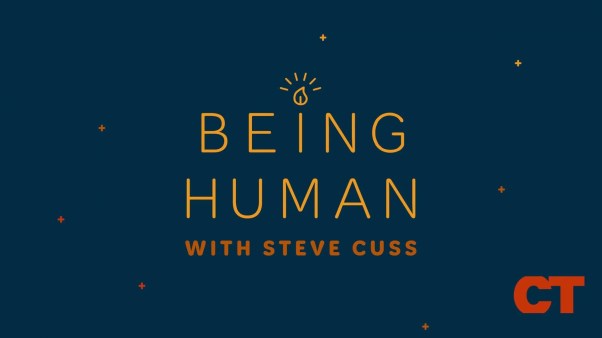“Coming Out Of Homosexuality,” by Bob Davies and Lori Rentzel (InterVarsity, 210 pp.; $9.99, paper). Reviewed by Stanton L. Jones, chair of the psychology department of Wheaton College, Wheaton, Illinois.
Homosexuality continues to be among the most divisive issues for this generation of faith. And accordingly, “Coming Out of Homosexuality” is certain to be vigorously attacked by those who feel that the church’s traditional stance on homosexuality is outmoded or inhumane.
In many mainline churches, the battle in favor of homosexual ordination and marriage is being fought on the basis of the stories of those who find their gayness and lesbianism to be a manifestation of God’s grace. This book will serve the church well by telling the stories of those who have successfully forsaken the homosexual lifestyle and pursued Christ into healing. This is not the first book to tell such stories, but Bob Davies, head of Exodus International, a leading outreach and support ministry to homosexuals, is in an ideal position to offer a broad vision of how God is working among Christians who struggle with homosexual inclination and behavior. His coauthor, Lori Rentzel, shares her own growth with equal grace and adds to the insight and utility of this book.
The reader of “Coming Out of Homosexuality” is presumed to be a person who is struggling with homosexual feelings and actions. This is not a “how-to” manual for would-be counselors; neither is it an apologetic defense written with pro-gay sympathizers in mind. Rather, the book offers inspiring testimonials, biblical exhortation, and even the conclusions of secular psychotherapeutic treatments of homosexuality to encourage the reader that change is possible.
Contrary to the prevailing wisdom of our age, Davies and Rentzel assume that our sexuality is not “something set in stone,” but that it is molded and shaped by our deep-set emotional attachments, needs, and wounds. As a consequence, there can be no universal, detailed, generic plan for healing. The authors therefore stress caution in setting initial expectations and goals, urging the reader not to aim necessarily at marriage and heterosexual bliss. Change in sexual orientation is not itself the goal, they suggest; rather, the goal is to have an intimate relationship with Christ and to be transformed by his grace in whatever fashion he deems suitable.
“Coming Out of Homosexuality” grapples in depth with breaking away from the gay lifestyle, and from such addictive patterns as involvement in pornography or intensely dependent relationships. Several chapters concentrate on reconstructing self-identity and changing the habitual beliefs and assumptions that keep a person trapped in dysfunctional patterns. A sensitive chapter on overcoming past sexual, physical, and emotional abuse is especially helpful.
HOPEFUL BUT CAUTIOUS
Davies and Rentzel have done well to include a simple, direct appendix that addresses and rebuts the confusing arguments of those who say Scripture is silent on or accepting of homosexual behavior. At the same time, they rightly reject the simplistic notion that all homosexuals are, in fact, heterosexual at the deepest level. Instead, they contend that sexual orientation itself is not a biblical category; that being a male or female in Christ is the foundation of our identity rather than a purely physical sexual orientation as our contemporary society defines it.
The authors are cautious in the goals they recommend and openly share about the struggles, downfalls, and ambiguities of the healing process. Nevertheless, critics of healing for homosexuals will undoubtedly attempt to discredit this book by leaping upon Davies and Rentzel’s frank admission that many healed homosexuals or ex-gays do not grow into the kind of pervasively lustful experience of heterosexuality that many heterosexuals have. But, as the authors observe, this is not a particularly needful or realistic goal to aim for in the first place.
Critics will also point to the book’s frequent mention of the continuing, though steadily diminishing, homosexual temptations and interests that healed homosexuals experience as proof that “healing” is not possible or natural. But here again, the critics typically exceed all reasonable bounds in what they demand as a cure: Few significant human problems get so utterly “cured” that no residual concerns remain. Depressed people often remain more vulnerable to depression in the future than the general public, and alcoholics often continue to have to strive for sobriety years after they have taken their last drink.
“Coming Out of Homosexuality” is not a perfect book. To begin, Davies and Rentzel seem a bit too insistent in their dismissal of biological factors that might constitute an influence or “push” for some in the direction of homosexual preference. Since they do recognize that certain life experiences from infancy through adulthood can have a powerful shaping effect upon choice, it is unclear why the same kind of understanding would not leave open the possibility of biological influences being operative for some homosexuals.
Also, despite the authors’ initial caution about goals—especially that the reader struggling with homosexuality not aim for marriage—it is ironic that the book itself seems to aim largely for marriage. Unfortunately, a sustained discussion of chaste, satisfied singleness occupies only two pages in the closing chapter of the book, while two whole chapters are devoted to finding healing in marriage. On a practical level, readers would be better benefited by hearing more about those who have been healed but not married.
Still, despite its oversights, “Coming Out of Homosexuality” has much to say to both those who think leaving homosexuality is something that can be easily done and those who reject the possibility of it altogether. Through research and testimony, Davies and Rentzel convincingly show that God’s power, though not immediately realized, is by no means impotent in healing the homosexual soul.
Copyright © 1994 Christianity Today. Click for reprint information.









